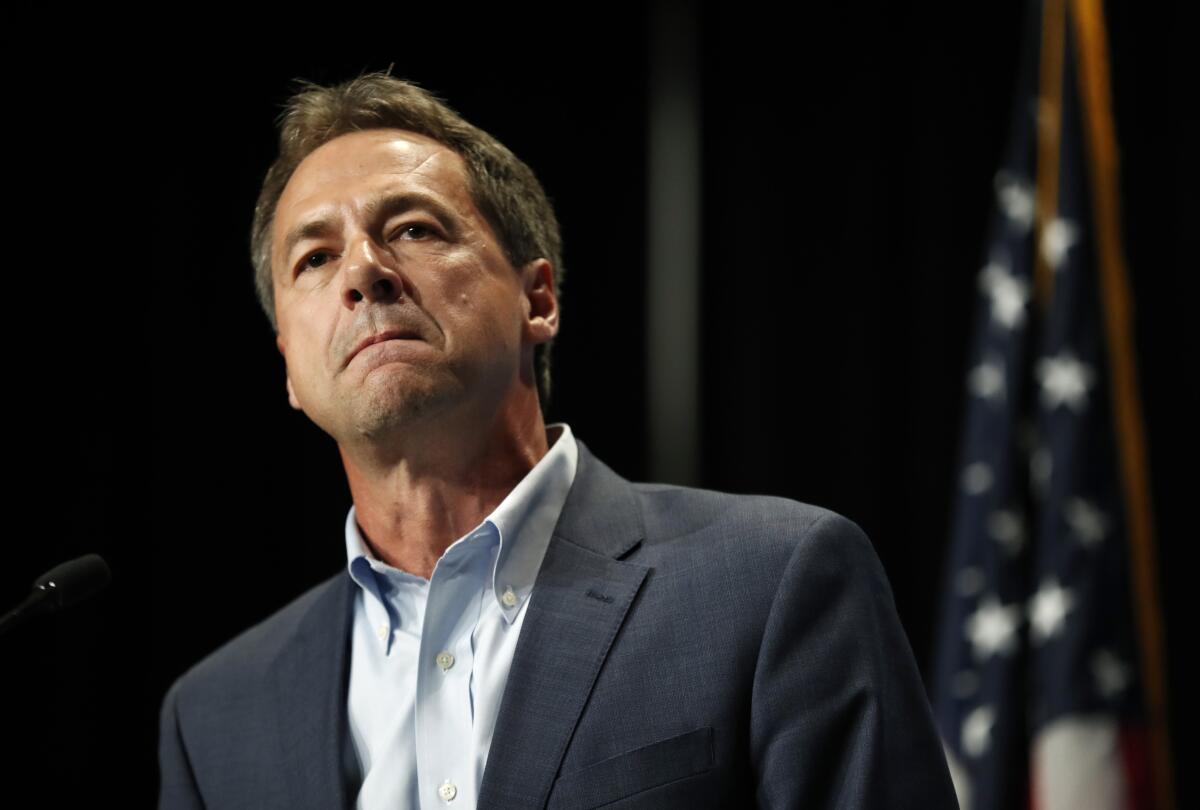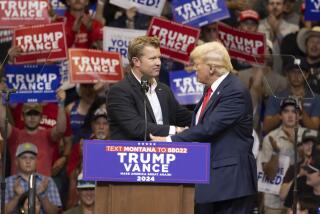Democrat Steve Bullock ends struggling presidential campaign

- Share via
Montana Gov. Steve Bullock, who brought a unique perspective to the presidential race as a red-state Democrat from the Rocky Mountain West but never emerged as a serious contender, abruptly ended on Monday his quest for the White House.
“Today, I am suspending my campaign to become the Democratic Party’s nominee for President,” Bullock said in a written statement. “While there were many obstacles we could not have anticipated when entering this race, it has become clear that in this moment, I won’t be able to break through to the top tier of this still-crowded field of candidates.”
He once again ruled out a run for U.S. Senate.
Bullock, 53, stood out among Democratic contestants as not just a relative moderate but a popular and effective governor in a state President Trump won by more than 20 percentage points. Working with a Republican-run Legislature, Bullock extended healthcare insurance to tens of thousands of residents and limited the influence of anonymous campaign donors to help make Montana’s elections more transparent.
He offered his record as a model of how to govern — reaching across the political aisle in a bipartisan manner — and for how Democrats could win back the White House, suggesting the party needed to hew more toward the political center and not lose sight of rural America and its values.
“As I stood there on the debate stage last week and listened to the next night, I saw [Trump’s] reelection become more likely with each passing minute,” Bullock said after July’s twin presidential debates, citing calls for ending private health insurance, extending medical coverage to undocumented immigrants and decriminalizing illegal entry into the U.S.
Medicare for all, the signature proposal of Vermont Sen. Bernie Sanders that others embraced, may “sell in Burlington,” Bullock said of Sanders’ hometown. “It won’t sell in Billings.”
Bullock’s appearance on July’s debate stage was the only one he managed under rules set by the Democratic National Committee, and he spent much of his campaign deriding the DNC and its criteria.
“I think the DNC rules were well-intentioned, but what it really has done is allowed a billionaire to buy a spot on the debate stage,” he said after Tom Steyer qualified for an October debate that excluded Bullock, among several others.
The affable and accessible campaign style that Bullock honed in Montana, where residents come to know their politicians on a first-name basis, served him well in personal interactions in Iowa, where voters expect the same kind of one-on-one attention. His favorable reception failed, however, to translate into broader support; Bullock registered hardly a blink in state and national polls.
He entered the contest relatively late — in May, after the Legislature finished its every-other-year session — and by then was one of two dozen contestants elbowing for attention.
Through a spokeswoman, Galia Slayen, Bullock reiterated his decision not to run for Senate in 2020. National Democrats have tried to coax the governor, whose term expires in January 2021, into the race, believing him to be the strongest and perhaps only competitive candidate against freshman GOP incumbent Steve Daines, who is seeking reelection in 2020.
“Governor Bullock will continue to faithfully and effectively serve the people of Montana as their Governor,” Slayen said. “While he plans to work hard to elect Democrats in the state and across the country in 2020, it will be in his capacity as a Governor and a senior voice in the Democratic Party — not as a candidate for US Senate.”
Bullock has been emphatic in ruling out a Senate bid, saying the job did not match his skill set and was not something he would enjoy.
More to Read
Get the L.A. Times Politics newsletter
Deeply reported insights into legislation, politics and policy from Sacramento, Washington and beyond. In your inbox twice per week.
You may occasionally receive promotional content from the Los Angeles Times.











